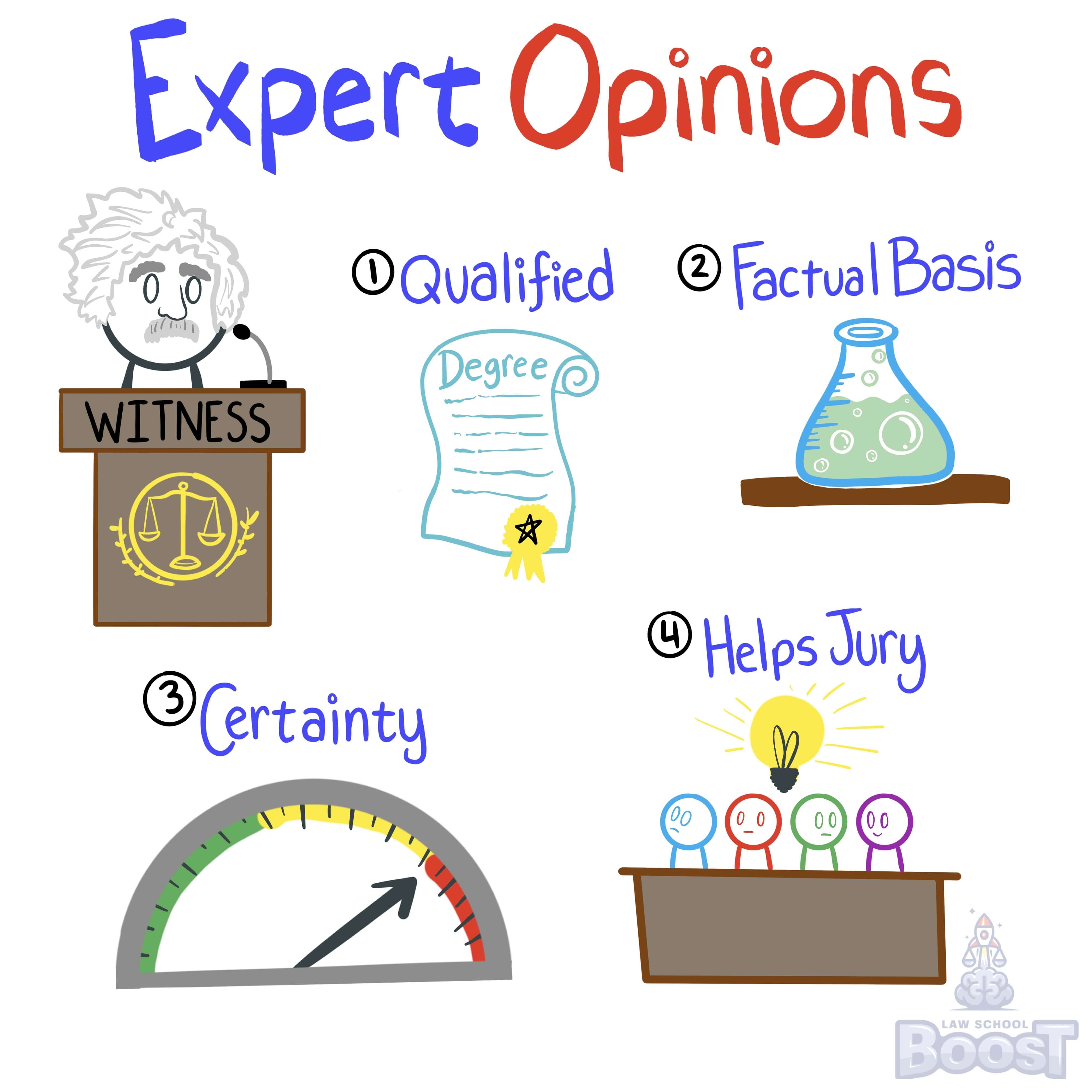🦅
Federal Evidence • Opinion Testimony
EVID#102
Legal Definition
For an expert's opinion to be admissible, the expert must (1) be qualified in the subject matter; (2) have a proper factual basis for the testimony; (3) believe in their opinion to a reasonable degree of certainty; and (4) offer testimony that provides some assistance to the fact-finder.
Plain English Explanation
Experts have special knowledge from their job and training. This rule allows them to share opinions in court using that knowledge to help figure out what really happened. For example, scientists can analyze evidence from a crime scene and doctors can describe injuries.
But not just anyone can claim to be an expert. The judge checks that the person really does have expert qualifications like advanced degrees and years of experience. That ensures reliable information for the case.
Also, experts can't just make up opinions. Their opinions have to be supported by facts and evidence they can explain. And they have to seem very confident in their opinions when testifying. That prevents guesses or speculations from carrying too much weight.
Overall, by allowing qualified experts to give well-supported opinions, the court gets knowledgeable perspectives to make better rulings. But it screens out unsupported or unreliable testimony that could mislead.
Ultimately, the expert's methodology must be generally accepted in the relevant scientific community and reproducible.
But not just anyone can claim to be an expert. The judge checks that the person really does have expert qualifications like advanced degrees and years of experience. That ensures reliable information for the case.
Also, experts can't just make up opinions. Their opinions have to be supported by facts and evidence they can explain. And they have to seem very confident in their opinions when testifying. That prevents guesses or speculations from carrying too much weight.
Overall, by allowing qualified experts to give well-supported opinions, the court gets knowledgeable perspectives to make better rulings. But it screens out unsupported or unreliable testimony that could mislead.
Ultimately, the expert's methodology must be generally accepted in the relevant scientific community and reproducible.
Hypothetical
Hypo 1: Bob sues a construction company for a bridge collapse. Sam, a civil engineer with 25 years of experience, testifies about the bridge's design flaws.
Result: Sam's testimony is admissible because (1) he's a qualified expert due to his extensive civil engineering experience, (2) he bases his opinion on a detailed analysis of the bridge design and material strength, (3) he expresses high confidence in his conclusions, and (4) his insights help the jury understand complex engineering principles related to the bridge collapse.
Hypo 2: Bob sues for emotional distress after a car accident. Sam, a professional race car driver with no psychological training, gives his opinion on Bob's mental state. Result: Sam's opinion is not admissible because (1) he lacks qualifications in psychology or mental health, (2) his opinion isn't based on factual or scientific knowledge in mental health, (3) his certainty is not grounded in relevant expertise, and (4) his opinion does not contribute to understanding Bob's emotional state from a professional standpoint.
Result: Sam's testimony is admissible because (1) he's a qualified expert due to his extensive civil engineering experience, (2) he bases his opinion on a detailed analysis of the bridge design and material strength, (3) he expresses high confidence in his conclusions, and (4) his insights help the jury understand complex engineering principles related to the bridge collapse.
Hypo 2: Bob sues for emotional distress after a car accident. Sam, a professional race car driver with no psychological training, gives his opinion on Bob's mental state. Result: Sam's opinion is not admissible because (1) he lacks qualifications in psychology or mental health, (2) his opinion isn't based on factual or scientific knowledge in mental health, (3) his certainty is not grounded in relevant expertise, and (4) his opinion does not contribute to understanding Bob's emotional state from a professional standpoint.
Visual Aids



